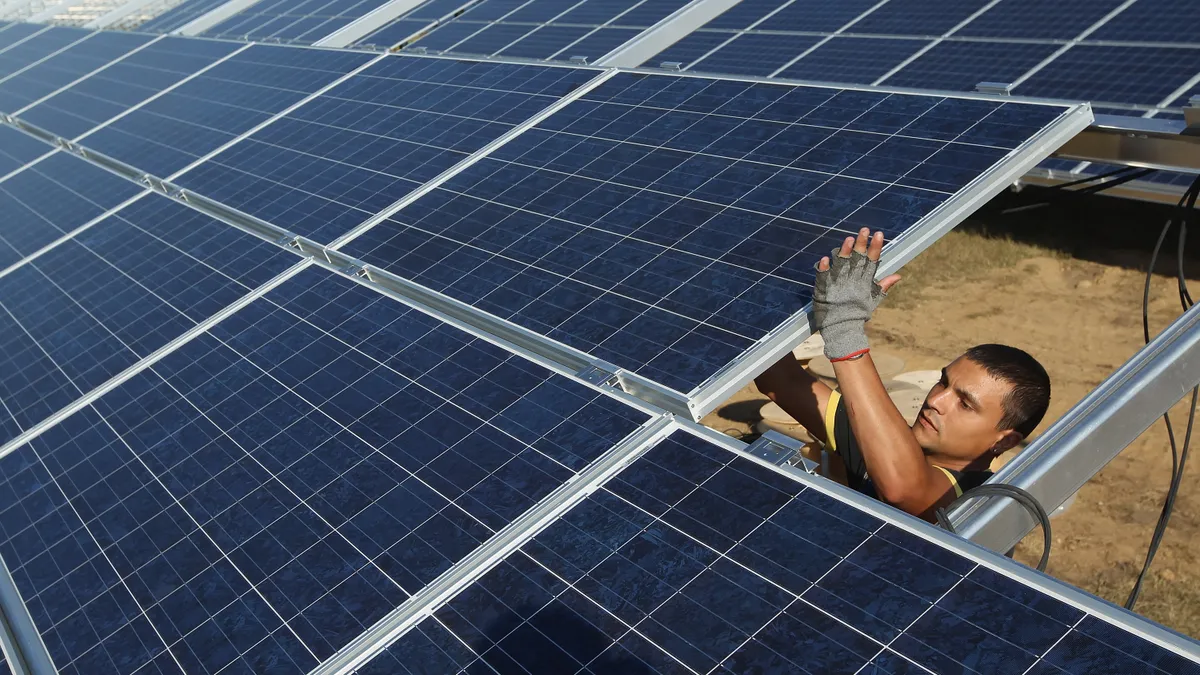Dive Brief:
- The head of the Arizona Corporation Commission (ACC) warned fellow commissioners that utilities run the risk of overbuilding renewable resources on ratepayers' dime and urged them to consider the danger when reviewing their pending integrated resource plans (IRPs).
- In a letter dated Wednesday, ACC Chairwoman Lea Márquez Peterson wrote that the last four years of commission action could be seen as "relentless effort to build more renewables, regardless of the cost to consumers or actual demand of the grid." Acknowledging or approving renewables proposed in utilities' 2019 IRPs "without first taking actions to protect ratepayers" would amount to "giving the utilities unfettered license to overbuild," she said.
- Adam Stafford, clean energy program staff attorney for Western Resource Advocates, said the letter "misconstrues" the goals of the IRP process, especially with Arizona's growing population and business base. Rather than restricting the buildout of renewables, Stafford said, ACC could focus on facilitating competitive bidding for new power generation that would reduce the rate impact to customers.
Dive Insight:
In May, the ACC voted against a proposal that would have set a 100% clean energy target for the state by 2050 and is now considering a longer-term 2070 deadline for the clean energy benchmark. A decision on that plan could come as soon as this month.
The state's investor-owned utilities, however, have their own plans. Arizona Public Service (APS) says it will achieve 100% clean energy by 2050 and Tucson Electric Power (TEP) says it will get 70% of its power from renewable sources by 2035.
However, Peterson's letter warns that utility investments in renewables "will likely represent the next iteration of utility overbuilding." Utilities, she said, built too much coal in the 1970s, nuclear capacity in the 1980s and, most recently, natural gas plants in the early 2000s. With a reminder that ACC's primary purpose in reviewing IRPs "is to protect ratepayers from the adverse effects of utility overbuilding," Peterson said commissioners should be vigilant in the 2019-2021 planning cycle.
"As it is likely that utilities will adapt previous overbuilding practices to align with the prevailing public policy objectives of our time, rather than cease such overbuilding practices altogether, the utilities and financially interested stakeholders that stand to benefit from overbuilding may seek to take advantage of the 2019-2021 planning cycle as an opportunity to overbuild renewables in the name of achieving a 'cleaner energy mix' or the 'transition' to a 'clean energy economy,'" she wrote.
APS and TEP did not respond to requests for comment on Peterson's letter before press time.
An analysis from Ascend Analytics released in August estimated that a 2050 clean energy mandate in Arizona could raise utility bills by about $60 a month, although it acknowledged that new technologies could lower the overall costs.
The letter also comes just over a month after ACC denied APS from recovering some utility investments as part of a decision to decrease APS rates. The utility called the decision "short-sighted" and threatened legal action, saying customer costs will rise in the long run.
Ellen Zuckerman, utility program director for the Southwest Energy Efficiency Project (SWEEP), said her organization is "very mindful of the issues that the chairwoman raised." Zuckerman pointed to analyses done of the TEP and APS resource plans by Strategen Consulting on behalf of SWEEP, which found that increased renewable capacity was the most cost-efficient and sustainable path for each utility.
"The good news is that these analyses underscore that expanded investment in clean energy, including energy efficiency and solar, are in the best economic interests of all Arizonans and are substantially cheaper than continued investment in fossil resources that pose significant stranded cost risk for us all," Zuckerman said.














